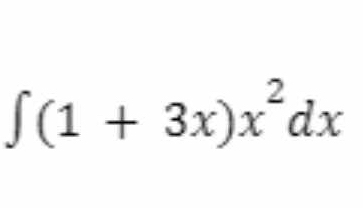∫(1 + 3x)x² dx

Understand the Problem
The question asks to solve the integral of the expression (1 + 3x)x^2 with respect to x. This involves applying integration techniques to find the antiderivative of the given polynomial expression.
Answer
The integral is $$ \int(1 + 3x)x^2 \, dx = \frac{x^3}{3} + \frac{3x^4}{4} + C $$
Answer for screen readers
The integral is
$$ \int(1 + 3x)x^2 , dx = \frac{x^3}{3} + \frac{3x^4}{4} + C $$
Steps to Solve
- Distribute the Expression
First, distribute (x^2) across the terms in the expression ( (1 + 3x) ):
[ (1 + 3x)x^2 = x^2 + 3x^3 ]
- Set Up the Integral
Now write the integral with the expanded expression:
[ \int (x^2 + 3x^3) , dx ]
- Integrate Each Term
Integrate each term separately. For ( \int x^n , dx ), the formula is:
[ \int x^n , dx = \frac{x^{n+1}}{n+1} + C ]
Applying this:
- For ( x^2 ):
[ \int x^2 , dx = \frac{x^{2+1}}{2+1} = \frac{x^3}{3} ]
- For ( 3x^3 ):
[ \int 3x^3 , dx = 3 \cdot \frac{x^{3+1}}{3+1} = \frac{3x^4}{4} ]
- Combine the Results
Now combine the results of the integrals:
[ \int (x^2 + 3x^3) , dx = \frac{x^3}{3} + \frac{3x^4}{4} + C ]
The integral is
$$ \int(1 + 3x)x^2 , dx = \frac{x^3}{3} + \frac{3x^4}{4} + C $$
More Information
This integral represents the area under the curve of the polynomial ( (1 + 3x)x^2 ) with respect to ( x ). The constant ( C ) is included as it represents any constant value that could be added to the antiderivative since the derivative of a constant is zero.
Tips
- Forgetting to include the constant ( C ) in the final answer is a common mistake.
- Not applying the power rule correctly when integrating can lead to errors in the final expression.